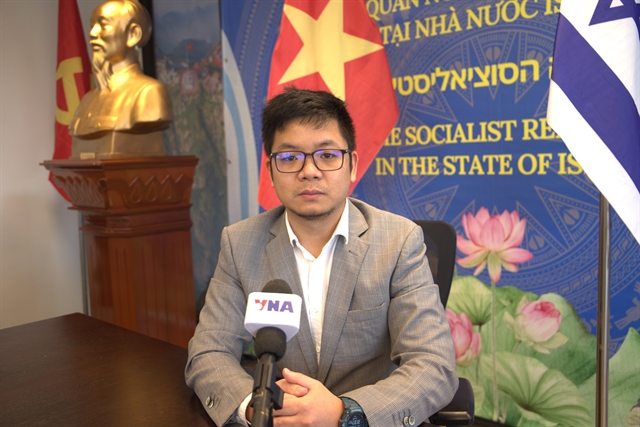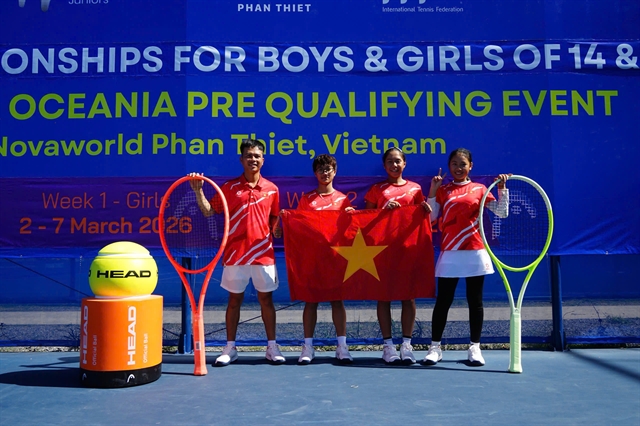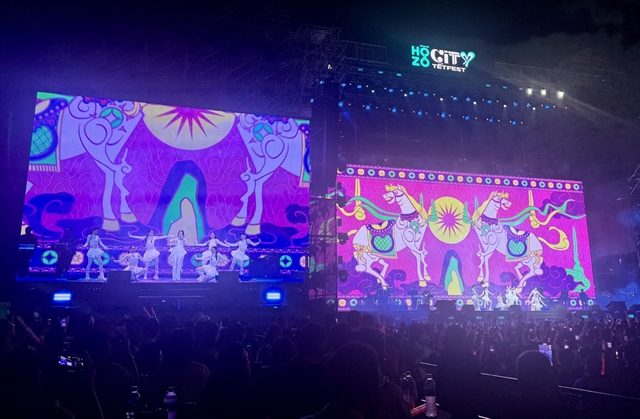 Features
Features
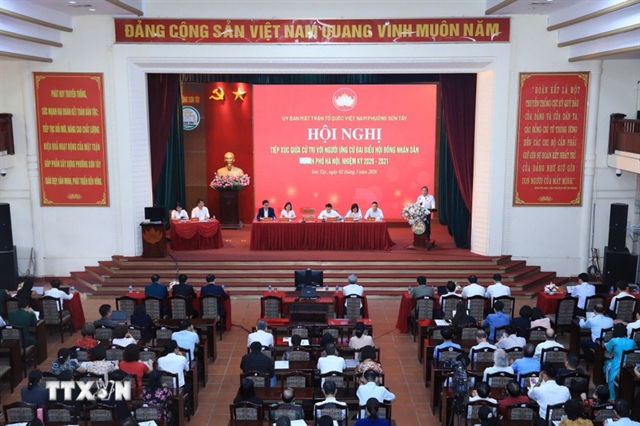
Covering an area of 97,000 hectares at an average height of 700m above sea level, Gia Lai coffee is a high quality centre of the Việt Nam coffee map and global value chain, bringing the ‘Gia Lai taste and flavour’ to the world’s coffee connoisseurs.
Công Thành
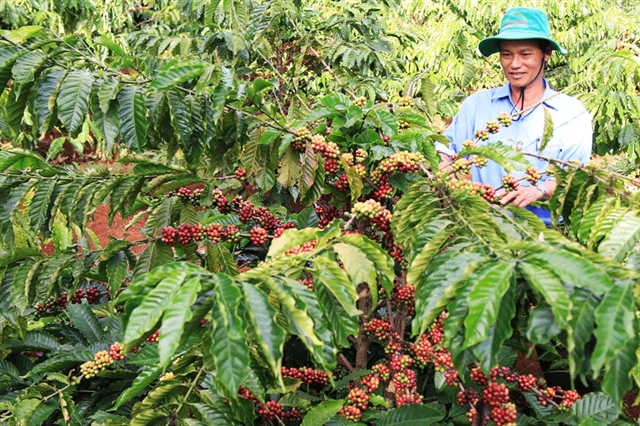
|
| A local farmer collects coffee cherries at a farm in Gia Lai Province. The Central Highlands province has been promoting sustainable high quality coffee. Photo courtesy of Gia Lai newspaper |
Covering an area of 97,000 hectares at an average height of 700m above sea level, Gia Lai coffee is a high quality centre of the Việt Nam coffee map and global value chain, bringing the ‘Gia Lai taste and flavour’ to the world’s coffee connoisseurs.
At least 50 businesses specialize in processing coffee in the Central Highlands region, contributing 50 per cent to the provincial total exports, earning around US$300 million per year.
Sustainable coffee production and farming has gradually been chosen by local farmers as a positive solution to pursuing high quality and brand building.
Nguyễn Huỳnh Phú Lâm, director of Classic Coffee joint-stock company, has been developing the ‘sustainable coffee’ brand in a value chain co-operation over a total of 1,200 hectares with 800 households in four districts – Chư Sê, Ia Grai, Chư Prông and Đak Đoa – since 2011.
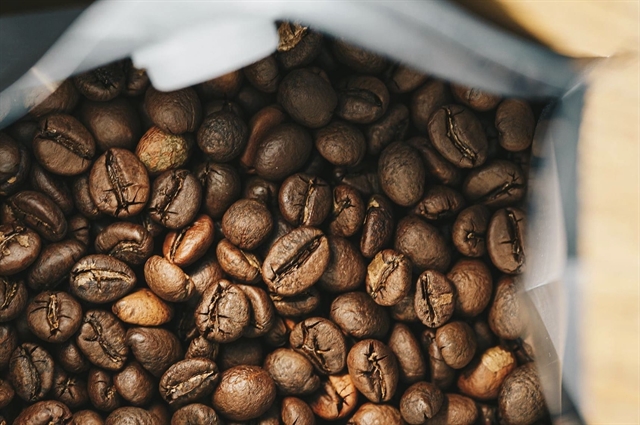
|
| Roasted Robusta coffee beans of Gia Lai are ready for final stage production. Gia Lai coffee has maintained its production and quality over past decades. Photo courtesy of Classic Coffee |
The ‘sustainable coffee’ community in the four districts benefit from bilateral business-farmer partnerships when they changed to high-quality farming under standards of the common code of the coffee community (4C) and Vietnamese Good Agricultural Practices (VietGAP).
“We encourage farmers to change to quality in production rather than quantity at low standard. Each kilo of standard coffee will earn a higher price from our company,” Lâm said.
“It brings benefits in two ways as we can collect the best quality coffee (green or raw coffee) for exportable processing, while farmers do not have to worry about unstable prices.”
Lâm, founder of Classic Coffee, said farmers should understand the value of the coffee they grow and care for.
He said more people now preferred a ‘clean’ and healthy product and paid higher for tasting ‘safe’ coffee, so farmers and businesses have to provide high-value coffee to the market.
The climate and basalt soil in Gia Lai in the Central Highlands region is suitable for growing Robusta coffee with a ratio of caffeine higher than Arabica coffee.
“There’s still a difference in processing between Robusta and Arabica. Coffee growers often dry coffee beans just after harvest time, while Arabica coffee beans are soaked in water before drying,” Lâm said.
“Vietnamese prefer the strong bitter taste of Robusta and making daily coffee by filter, but Europeans love drinking Arabica coffee. It’s the reason I’m thinking of improving Robusta coffee so it tastes as good as Arabica from crops and processing innovations. Robusta coffee processing should be improved to earn a larger market share.”

|
| Workers complete the final stage of coffee production at a factory in Pleiku City of Gia Lai Province. Coffee earns 50 per cent of Gia Lai province's export turn-over each year. Photo courtersy of Classic Coffee |
He said farmers earn a surplus VNĐ700 (30 US cents) profit from the base purchasing price on every kilo of 4C or VietGAP brand coffee in comparison to low quality coffee from businesses.
The farmers could benefit from added value on each kilo of roasted coffee by about VNĐ8,000 to 12,000.
Lâm explained that business reserve a percentage of the surplus income for farmers was a way of ensuring high-quality plantation transformation.
Brand partnership
“Farmers should know how to benefit from sustainable coffee farming rather than easy and low quality crops as usual. The bilateral business-farmer partnership will play a key role in marking Gia Lai Robusta coffee in Việt Nam and the global coffee manufacturing community,” he said.
Đoàn Ngọc Có from the provincial department of agriculture and rural development said more than 8,000 households, of which 50 per cent were ethnic minorities, had begun growing coffee under standards of VietGap or 4C for export.
He said organic farms were built in key coffee zones for improving the quality of Gia Lai brand coffee and offering diversified products in the future.
Trần Thiện Văn, a coffee grower in Chư Sê District, said his family reserved one hectare – a third of their total area – for collecting 6 tonnes of high quality raw coffee.
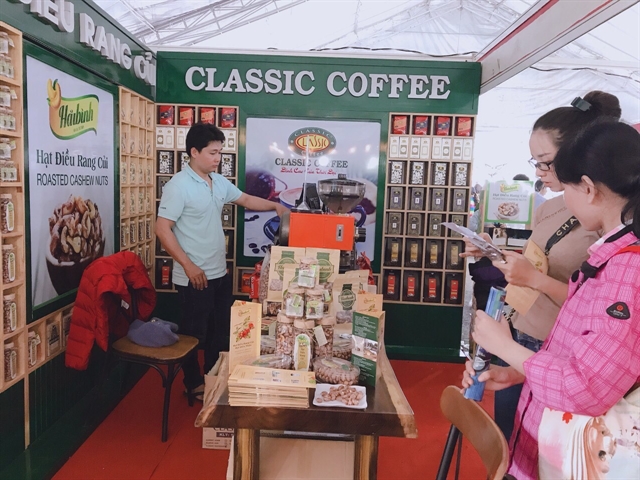
|
| A shop introduces Gia Lai coffee to customers. Gia Lai Province produces 220,000 tonnes of coffee per year. Photo courtesy of Classic Coffee |
He said his family would grow two more hectares in the next crop for a higher income and stable price.
“Several years of pilot growing standard coffee earned me a bigger income on the crops,” Văn said.
Nguyễn Ngọc Nghĩa from Đak Đoa District – a key coffee farming zone – said he harvested 7 tonnes of raw coffee from each hectare of his own 20-hectare high quality farm, bringing high revenue of VNĐ100 million per hectare per crop.
Chairman of Việt Nam Coffee and Cocoa Association Lương Văn Tự said coffee production in Gia Lai had remained stable in term of quality and output as well as manufacturing over past decades.
He said many coffee producers in the province had invested lots in technology, innovation and sustainable production for promoting the local coffee brand.
At least 50 enterprises in the province joined such processing, producing 3.5 per cent of the provincial coffee output (about 220,000 tonnes) each year.
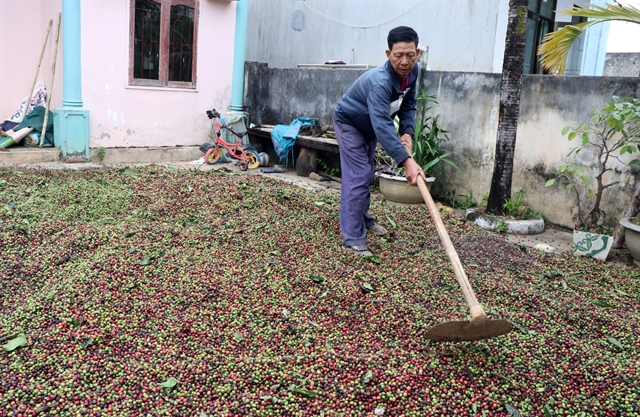
|
| A farmer dries coffee cherries in harvest season in Gia Lai Province. Robusta coffee is a major crop in the Central Highlands province. Photo courtesy of Hoàng Cao Nguyên |
Lâm expects the high quality coffee farm area in the province to be expanded as a base for improving Robusta coffee quality.
“Someday coffee connoisseurs in the world will be tasting the best Gia Lai Robusta coffee brand as local farmers have improved their coffee flavour to suit consumers' taste,” Lâm said. VNS



